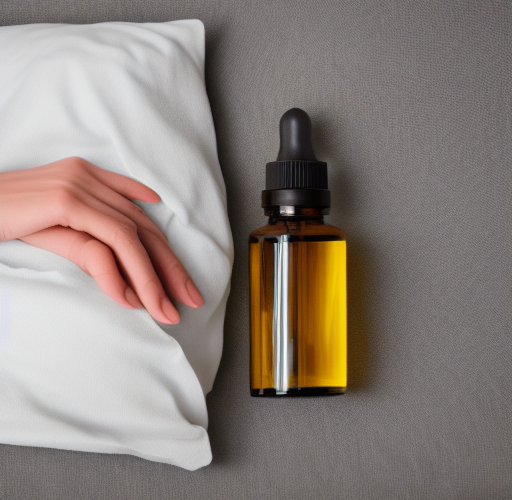These days, sleep problems are commonplace. The causes can be many - health ailments, disrupted daily rhythm, unhealthy lifestyle, poor eating habits including high caffeine intake, lack of physical activity or late workouts, unfavorable conditions in the bedroom, stressful lifestyle, or staring at smartphone screens and other devices, which causes brain stimulation.
Deep rest and quality sleep is a basic human need and is essential for daily functioning. That's why it's so important to take care of the phases of sleep, allowing for rest and recovery.
In addition to improving the basic elements that affect healthy sleep, it's worth looking into supplements that can also have a positive impact on nighttime rest. Such a supplement could be the use of CBD oil.
What is insomnia?
Insomnia is the term for regular sleep problems. It often results from poor sleep habits. Unhealthy habits that can affect sleep include, for example, eating a hearty meal just before going to bed, not calming down before bed, or using a laptop or smartphone in bed just before going to sleep.
These are just examples of activities that can make a difference in getting a good night's sleep. Insomnia can manifest short-term and last up to 3 months. However, when sleep problems last longer than 3 months it is long-term insomnia.
Most people will experience sleep disorders in their lives, as there are many reasons for their occurrence. It is worth remembering that each person needs different amounts of sleep. On average, children need to sleep longer than adults. If you are constantly tired during the day then you are probably not getting enough sleep. An interesting fact is that an adult sleeps 1/3 of his life.
The most common symptoms of insomnia
If you are wondering if you are suffering from insomnia, the most common symptoms you may be experiencing are listed below:
- You have difficulty falling asleep,
- You repeatedly wake up during the night,
- You can't fall asleep, you lie in bed all night and don't fall asleep,
- You wake up in the morning and can't fall back asleep to sleep some more,
- You have a feeling of fatigue after getting out of bed,
- you are irritable during the day,
- You have trouble concentrating due to sleep deprivation.
These are the most common symptoms of insomnia, which should alert you that something is wrong and you should look into it.
The most common causes of insomnia
As mentioned earlier, the causes of sleep disorders are many. The most common are listed below:
- stress,
- anxiety,
- depression,
- inadequate sleeping conditions:
- noise,
- inadequate temperature in the bedroom (the optimal temperature should be between 16-18 degrees),
- Uncomfortable bed and pillow,
- use of stimulants:
- drinking alcohol,
- Overuse of caffeine (coffee, tea),
- Nicotine (cigarette) use,
- jet lag (sudden time zone change syndrome),
- Shift work (disrupted daily rhythm).
There may be many more causes of insomnia, and they may be related to health conditions, medications taken, illnesses, as well as nightmares and night terrors. Hence, when insomnia is not accompanied by typical causes, it is worth exploring the topic and looking at other, less typical reasons.
How can you affect insomnia yourself?
Crucial to sleep will be correcting any bad habits that can impair sleep quality on a daily basis. Other sample actions you can take are included below
- Try going to bed and getting out of bed at the same time every day,
- Relax and calm down at least 1 hour before bedtime by, for example:
- Bathing,
- reading a book,
- relaxation yoga,
- Create the right conditions in the bedroom room by:
- Installing curtains, blinds or shutters (or covering them if you already have them),
- Try to lead an active lifestyle and exercise regularly during the week,
- Make sure the mattress and pillows are comfortable and suitable for the spine,
- Get a blindfold and ear plugs if necessary.
Of course, one could list even more activities that translate into the fight against insomnia. Listed are the general ones that affect everyone.
However, the most important thing is to look at your own actions and habits and approach sleep disorders individually.
In addition, think about supplements that can help in the quest for a good night's sleep. One such supplement could be CBD oil. If insomnia is caused by external factors or related to the environment and prevailing conditions then using CBD can help fight the causes of insomnia.
Does CBD oil affect sleep?
CBD is one of the main cannabinoids in hemp. These are active ingredients extracted from the plant. Cannabinoids affect the endocannabinoid system, which helps the body maintain a state of balance and stability, or homeostasis.
The body's cannabinoid system watches over the biological clock. Hence, CBD can help maintain the rhythm of the day and help shape the daily sleep cycle. Some studies suggest that CBD can help fight insomnia.
How does CBD oil work on sleep disorders?
First of all, CBD helps in dealing with the most common causes of insomnia such as stress. People suffering from insomnia are often characterized by high levels of cortisol in the evening and at night, which prevents good and deep sleep.
Research on CBD and sleep
The topic of CBD and its effects on sleep has been subjected to a number of studies, but there are still many aspects that need to be explored in more depth in order to draw further conclusions.
Test results regarding cannabidiol's effects on anxiety and sleep found that levels of cortisol, the stress hormone, decreased after CBD use. Sleep disorders eased within the first month of the study in more than half of the subjects, but sleep problems continued to fluctuate. Nonetheless, CBD oil can be considered to have a calming effect, assisting in the release of cortisol and helping to reduce anxiety. People suffering from insomnia, those who are stressed and have anxiety disorders can benefit by taking CBD.
Study from 2018, published in Medicines, confirms the theory that CBD and cannabinoids have positive effects on sleep. The results of the study indicated that cannabinoids in hemp reduced insomnia symptoms. However, a limitation of the study was the use of hemp flower, which contains few cannabinoids, and it is difficult to determine to what extent the alleviation of insomnia was due to the effects of CBD.
Other research of 2019 published in the Permanente Journal on insomniacs who were given CBD in capsule form before bed confirmed that CBD reduced sleep difficulties. However, there were fluctuations in sleep quality over time in the later phases of the study.
Still others research from 2016 also posted in the Permanente Journal being a case study of a 10-year-old girl with post-traumatic stress disorder and poor sleep showed that CBD improved sleep quality and quantity over several months.
Conclusions about CBD research
Although there are studies that confirm in certain cases that CBD and cannabinoids can improve sleep, the results are not conclusive and more research needs to be done to make a clear assessment.
Effects of taking CBD
In accordance with test results CBD has a calming effect on the nervous system. This translates into improved mood by increasing serotonin levels in the brain. Adequate levels of this substance increase feelings of happiness and calm, improve concentration and emotional stability.
When it comes to sleep, serotonin also plays a significant role. Its deficiencies are associated with anxiety, which has a direct impact on insomnia. It is important to remember that the effect of CBD depends on the dose. Low doses of CBD show a stimulating effect on the brain, while high doses can act as a sedative.
Before you reach for CBD oil
Specialists note the potential for CBD to interact with drugs, herbs and supplements. The effects of combining these substances depend on the dose of CBD, the dosage of the medication and the condition. Therefore, it is best to consult a doctor or pharmacist before taking CBD in any form.
It is a mistake to assume that since CBD oil is a natural product, it must be safe and cannot harm. This is very likely to be the case, especially in older people taking a lot of pills and with poor health. Therefore, before buying a bottle of CBD oil even if only to improve the quality of your sleep, think about the substances you are already taking so that you don't harm yourself.
How to use CBD for sleep?
Once you are sure that you can use CBD oil and purchase the product of your choice, it is important to read the leaflet and the instructions for use, which must be followed.
In accordance with research of 2017 and research of 2020 below are the most important tips for using CBD for sleep:
- Regardless of the concentration, the oil is usually applied under the tongue and waits a few tens of seconds,
- In the beginning, it is enough to use a few drops of CBD oil, but over time you can try to increase the dosage,
- Those starting to take CBD should reach for a lower concentration and gradually increase it over a longer period of time,
- It usually takes about 20 minutes or more for CBD to take effect, so it's a good idea to apply the oil up to an hour before bedtime.
Sleeping pills vs. CBD oil
As mentioned earlier, CBD oil can be helpful for insomnia. However, it is common for people struggling with sleep disorders to reach for sleeping pills. Therefore, an important issue is the safety of CBD and sleep pills.
BD can react with various substances the pills may contain. Therefore, it will be necessary to determine whether it will be safe to use CBD oil and sleep pills at the same time. It is best to consult a doctor or pharmacist in this case.
Resume
Existing evidence and research suggests that CBD oil can help restore healthy sleep for people struggling with insomnia. In treating insomnia, it is important to eliminate the direct cause in the sleep disorder. The use of CBD oil for sleep can support this process, improving the quality of sleep.
Also, be sure to consult a knowledgeable person before starting to use the oil. Although CBD is a natural substance, it can interact with other substances (especially medications) taken in pill form.

